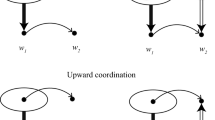Conclusion
The paradoxes act as restraints on undisciplined or erroneous reasoning and so perform a valuable role. The fact that they have resisted solution for so long suggests that the current systems of logic are defective. The paradoxes of set theory, in my opinion, completely condemn all the current forms of set theory and their associated definitions of the natural numbers. Nothing short of a complete review of the whole area seems capable of remedying the situation.
Similar content being viewed by others
References
Balzer, N. (1987). What is a class? The Journal of Value Inquiry 21(2): 111–130.
Balzer, N. (1988). What is a natural number? The Journal of Value Inquiiy 22(2): 103–113.
Balzer, N. (1989). The logic of arithmetic. The Journal of Value Inquiry 23(2): 99–121.
Balzer, N. (1990). The logic of implication. The Journal of Value Inquiry 24(4): 253–268.
Balzer, N. Classes and inference. The Journal of Value Inquiry, forthcoming.
Kamke, E. (1950). Theory of sets, pp. 79–91. Dover Publications.
Kneale W. and M. (1984). The development of logic, p. 655. Oxford University Press.
Author information
Authors and Affiliations
Rights and permissions
About this article
Cite this article
Balzer, N. The paradoxes. J Value Inquiry 26, 189–197 (1992). https://doi.org/10.1007/BF00138967
Issue Date:
DOI: https://doi.org/10.1007/BF00138967




